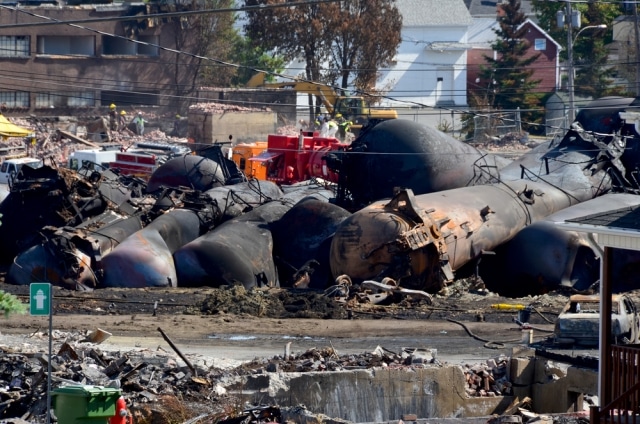The Department of Transportation released its Notice of Proposed Rulemaking today for the transportation of crude oil and ethanol by rail. With the release of the proposed new regulations, a public comment period now begins before the rules will be finalized.
The proposed rules offer a wide variety of options for the public to comment on with the weakest proposals essentially being the status quo, as is the case for the rail tank car recommendations.
These proposed regulations have been under review for the past several months at the White House’s Office of Information of Regulatory Affairs where industry lobbyists have been hard at work to weaken and delay the regulations. An initial review of the proposal makes it clear their efforts have paid off and first reactions from advocates for increased safety reflect this.
Matt Krogh, of ForestEthics, the group which recently released a website where people can check if they are within the blast zone for the oil trains, released a statement telling the Obama administration to “go back to the drawing board and put public safety first.”
“Today the Obama administration announced weak new standards for high-hazard flammable trains that give the oil industry a license to threaten the safety of millions of Americans and leave communities and emergency responders holding the bag.
The administration seems to have carefully calculated and managed the inconvenience of these rules to the oil industry, but they’ve severely underestimated the threat of these trains to the American public.”
A review of the proposal reveals many things in the industry’s favor.
First and foremost it proposes that the new rail tank construction standards would go into effect on October 1, 2015. So, all of the oil transported by rail between now and then will be in cars that have been deemed to be unsafe to transport explosive Bakken crude oil.
And while the American Petroleum Institute has been arguing that Bakken crude is no different from other crude oils, the Pipeline and Hazardous Materials Safety Administration (PHMSA) also finally released its report on Bakken crude today. The press release states: “The data show that crude oil from the Bakken region in North Dakota tends to be more volatile and flammable than other crude oils.”
According to the proposed regulations, that oil will continue to be shipped in unsafe DOT-111 cars for at least another two years at which point the DOT-111s will be phased out for use transporting crude oil. But there is a catch. From today’s DOT release:
Specifically, within two years, it proposes the phase out of the use of older DOT-111 tank cars for the shipment of packing group I flammable liquids, including most Bakken crude oil, unless the tank cars are retrofitted to comply with new tank car design standards.
They are proposing only phasing out the DOT-111s for packing group I flammable liquids so packing group II and III could still be shipped in DOT-111s. Tests of the oil from the Lac-Megantic disaster revealed that the oil should have been classified as packing group II. Under the proposed new regulations, the Lac-Megantic train would be in compliance. So, the public’s safety will be dependent on the oil producers properly classifying the Bakken crude, something which they have failed badly at in the past.
For two years after these new regulations are implemented, which mostly likely will be some time in 2015, shipping Bakken crude in DOT-111s will be within regulations. And after that retrofitted DOT-111s will be acceptable. However, it is important to note that while retrofits add safety features to the older cars, they can not address one of the main issues that make the cars unsafe — tank car wall thickness. If the new regulations require new tank cars to have 9/16th inch walls, a retrofitted DOT-111 will still always only have 7/16th inch walls.
After the proposed two-year phase out, only packing group I oil will have to be shipped in new tank cars. The proposed regulations say that then for all other oil, the DOT-111s must be retrofitted “to meet the selected option for performance requirements” and that tank cars that are not retrofitted “would be retired, repurposed, or operated under speed restrictions for up to five years.” So there is a proposed five-year phase out for DOT-111s for oil not in packing group I.
Similar language favorable to industry exists in several of the other sections of the proposal. Forty mile per hour speed restrictions have been proposed, but only for the existing flawed tank cars. They would not apply to any train using the new proposed tank car standards, the weakest of which is the existing CPC-1232 tank car, one of which failed in the Lynchburg, VA, crash, which occurred at a crash speed of only 24-mph.
Additionally, there is a proposal for limiting speeds of trains that do not comply with “enhanced braking requirements” to 30-mph. However, in the enhanced braking requirement section of the proposed recommendations it states that the implementation of these requirements would be “depending on the outcome of the tank car standard proposal and implementation timing.” Many of the proposed regulations are written to be dependent on the outcome of other proposed regulations, leaving plenty of room for future manipulation.
At the end of the National Safety Transportation Safety Board (NTSB) hearing in April on transporting crude oil and ethanol by rail, NTSB Chair Deborah Hersman responded to Lee Johnson, a representative of the American Petroleum Institute, who had given his outlook on how long the DOT-111s would be in service for transporting crude oil. The estimate being discussed was 10 years. Hersman summed up her feelings on this with a final statement.
“You’re not making me feel very optimistic, Mr. Johnson.”
Based on these new proposed regulations, it looks like her pessimism was fully justified.
Image credit: Lac Megantic oil train explosion aftermath via Shutterstock.
Subscribe to our newsletter
Stay up to date with DeSmog news and alerts






